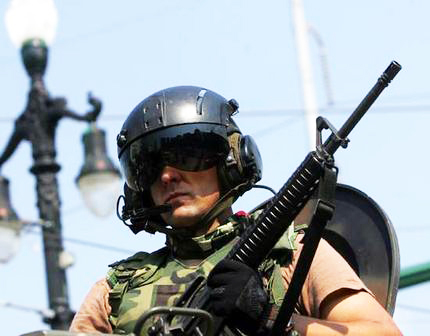Knowing what 9/11 did to America, it would be easy to assume that an overeager desire to prevent another such tragedy is why our cops look and act more and more like the military these days.
Videos By Rare
Yet the drug war — first “declared” by Richard Nixon, then militarized by Ronald Reagan — and various laws that came out of the tough on drugs and crime panics of the ‘80s is why every small town seems to have a SWAT team today. Officer Friendly has been taken over by RoboCop.
Though the push-back against the drug war has begun at long last, thanks to successful legislation efforts in Colorado and Washington state, most legislators have yet to stare down the new face of the police themselves.
One rare exception is Rep. Hank Johnson (D-Ga.). On March 10, he co-authored a USA Today editorial in which he announced his plan to introduce legislation which would hinder the Pentagon’s 1033 program that allows police departments to acquire surplus military equipment.
But how much success will legislation have when it aims to restrict willing recipients from receiving tech that might just be destroyed? Not as much as it should.
Since 9/11, cops have been given more powers and privileges for fighting terrorism. The New York Police Department (NYPD) now performs a great deal of CIA-ish surveillance in the name of preventing another attack. New York City Mayor Michael Bloomberg even described the NYPD as his “private army.”
But that’s kind of reasonable, right? Nobody in America suffered from 9/11 like the people of New York City did. Plus, every once in a while — such as the case of the Boston bombing — the soldier-like reaction by cops is understandable, if troubling.
Still, manhunts for terrorists are always exceptions to the rule. Banal — even consensual — crimes are the still the main focus for police departments who have become more and more beefed up over the past 30 years with no equivalent forces of violence to justify this increase of power.
Not only do they now use military hardware, but they very nearly are the military themselves. Perhaps this change was inevitable in part because body armor and weapons advanced, allowing police to be more protected for truly dangerous situations.
But the policy of prioritizing drug crimes during the 1980s didn’t just balloon our prison population to its current, shocking levels of over 2 million inmates. It also led to laws such as the 1981 Military Cooperation with Civilian Law Enforcement Agencies Act, which permitted military support for certain police endeavors including drug raids.
A few years later, at your most dramatic point, you had Blackhawk helicopters and actual U-2 spy planes used to sniff out marijuana grows in Humboldt County, California.
Since 1994, the Pentagon’s 1033 program has passed out surplus military tech to police departments across the country. Lately these have even included MRAP (Mine Resistant Ambush Protected) vehicles.
And since its creation post-9/11, the Department of Homeland Security has offered grants to police departments looking to stock up on cool toys in the name of anti-terrorism.
The problems with police who look and act like members of the armed forces are myriad. One is Constitutional. Supreme Court decisions have affirmed that a warrant isn’t necessary if police have probable cause to prevent a suspect from destroying evidence — or just flushing his stash.
Today most of the 100 or so daily SWAT raids on private homes are over narcotics. These raids further destroy the Fourth Amendment and the Castle Doctrine, both of which are supposed to preserve our home as a place of privacy and sanctuary.
Worse, the sudden arrival of police at the door, sometimes in the middle of the night or early morning, can lead to deadly consequences for police and homeowners alike.
Another problem with a SWAT 24/7 culture is purely psychological. The message to police officers that they are warriors leads to a question: whom are they fighting?
And when police come into neighborhoods dressed in body armor, occasionally riding in armored cars, or covering their faces — looking like they’re ready for a war or at least a riot when they are going after a pot smoker or checking the liquor license of a bar — is it any wonder that folks react as they would to a bully or worse?
That’s a logical, probably primal reaction to an invading army coming onto your turf. And in response to that distrust, resentful police start to believe that half the population is untrustworthy scum. So even after violence crimes, when people should speak to police, there develops a culture of silence and “no snitching.”
More mission creep has even lead to SWAT-like officers performing regulatory raids on bars. This defies logic, considering the original purpose of SWAT. What reason is there to arrest patrons and employees of a “massage” parlor while dressed for war beyond intimidating, or paranoia that the world is full of cop killers? (Statistically, it isn’t.)
So if police are fighting us, that explains their fear and their itchy-trigger fingers, and the lack of accountability for their sometimes-deadly actions. If cops today are warriors, they are by definition not de-escalators. They are supposed to win the war, not risk their own safety to make sure that a situation doesn’t turn violent.
In short, soldier cops are dangerous to American freedoms. Rep. Johnson is right to try and curb this problem. Whether it’s too little, too late, is another question.

